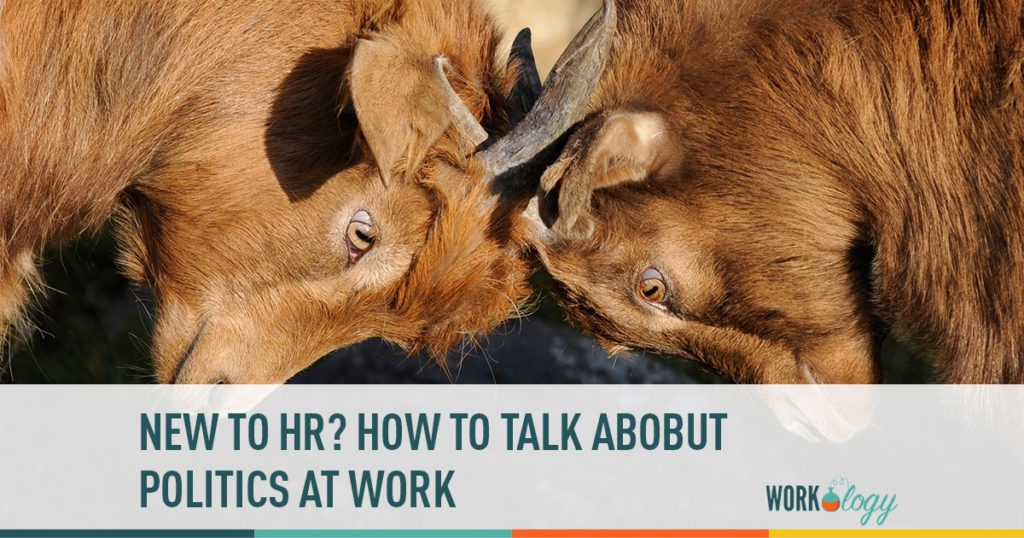How to discuss politics at work? Ok, I’ll break it down: don’t!
Ok, seriously, the topic of politics will inevitably be brought up in the workplace. Every HRPro has heard the saying, “don’t talk religion, politics, or sex in the office,” but how realistic is this? HR holds many secrets of a workplace. We give the speeches on what employees should and should not do. But let’s be honest, they don’t always listen.
There is a great storm brewing in Washington right now. When you turn on the news, radio, tv, log into social media, read the newspaper (yes, people still read the newspaper) there is always a “Breaking Now, Trump Says…” being discussed. I’ve even tried to block his Twitter account, but he still won’t go away!
How to Talk About Politics
Politics will be discussed in the office, but what’s important is how you respond. As the HRNewbie, you won’t know all of the office politics, who usually votes for which side, how a person expresses their views.
Be careful when this is the choice of discussion, it is best to:
- Keep your thoughts to yourself.
- Keep the environment positive.
- Be respectful at all times.
- Don’t allow the conflicts to shift your focus of getting the HR education you are seeking.
- Don’t take sides in the matter.
It will not be an easy task. There are many things happening that we should not stand for as human beings. There are certain movements we need to acknowledge and the distruction or discrimination of others is not how it is done. It’s important that you don’t lose who you are as a person in a new office, it is important that you still stand for what you believe. By no means will any part of HR be easy, but you now have an important role, and your employees who are being affected by this administration should know your door is always open.










2 Comments
This is great article and an excellent topic and so glad you brought it up. It’s great advice for newbies and seasoned folks alike. As HR in any environment, it’s important to model the behavior you expect. Many times clients try to engage me in politics and I respectfully shift gears to the purpose of our call/visit. Same goes with my immediate peers, but it’s a little easier to shut them down. Nonetheless, it is a lesson learned for all!
How Talking About Politics the Right Way Promotes Inclusion
Most federal employees I know follow the rule of not talking about politics from lessons learned at the feet of their family members during Thanksgiving and Christmas dinners. “Thou shalt not talk politics at the dinner table or at work.”
Two recent studies seem to reinforce this notion that political expression is not welcomed in the very location we spend most of our adult lives-the workplace. Korn Ferry Hay Group, a global management consulting company surveyed their executives on the question of political debate and the workplace. 56% of them indicated that disclosing their political affiliation hurt their career. 17% of them said they lost business contacts due to their political stances and 23% of these high performers claimed the current political landscape gets in the way of job performance.
Clutch, a software and professional services brokerage firm dove into this political debate with a survey of their co-workers on political strife. 31% of their employees experienced a decrease in productivity as a result of political conversations with their peers. 12% of their staff pointed out that they felt uncomfortable with political conversations at work.
While many of us shun political differences in the workplace, Andres Tapia, Korn Ferry Hay Group senior client partner and solutions leader claims that political inclusion is the new frontier in the race to recognize and embrace political distinctions. He indicated the key is the creation of a non-polarizing environment where people listen to each other.
We have this unconscious tendency to place political views in either good or bad camps. Good for people who share our political beliefs and bad for those who don’t. We start pointing fingers at each other as we divine political views as foe or friend. The problem with this blame each other approach is that it often times drives political bias deeper to a level that stops the conversation. Once that happens, all bets are off as neither party may have another opportunity to address the situation as a collective outcome.
Differences have to be communicated in a way where we do not assail someone’s humanity and basic civil rights. If your contribution to the political discussion threatens these tenets, then you should not be surprised when you receive pushback that those views are not welcomed in a setting that recognizes that core value. Political discrimination is not appreciated in this dialogue. Political hate speech will be shown the door.
Political equality requires basic human decency. Anything less creates a world order and workplaces that benefit the loudest and meanest voices in the room.
There will always be space for political expressions in the struggle for inclusion. But only if that language recognizes the need for safety at a sacred altar reserved for participants who seek to multiply and not diminish.
We must talk about politics in the workplace because we are human. To deny our humanity will disallow the inclusion we claim to so desperately want.
Comments are closed.